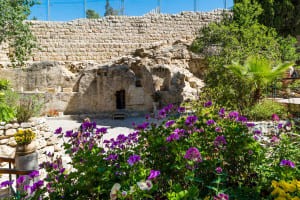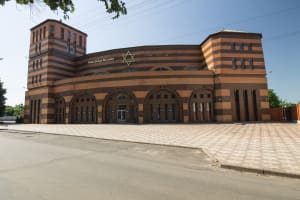ARISE panelists extol bilateral business and investment relations between the UAE, Israel since signing of Abraham Accords
UAE-Israel cooperation and collaboration has a transformative impact on the economy and society of the Gulf region

There has been an incredible outpouring of excitement from both Israel and the United Arab Emirates on the part of entrepreneurs, innovators, companies and investors since the signing of the Abraham Accords.
That was the assessment of Asher Fredman, founding member of UAE-Israel Business Council (UIBC), and current CEO of Gulf-Israel Green Ventures.
Fredman, one of three panelists interviewed during the second session of the ARISE Digital Summit 2021 on Nov. 30, said the excitement has to do with business opportunities but also the “people-to-people piece,” which he called the secret sauce for building a better future in the region.
The Abraham Accords, signed in Sept. 2020, normalized relations between Israel and the UAE, Bahrain, Sudan and Morocco. This was the theme of this year’s ARISE Summit, an annual event that aims to match companies, empower businesspeople and engage communities to take part in the opportunities emerging from Israel and the Middle East. This is the second year in a row that the ARISE Summit has taken place online rather than in person due to COVID restrictions.
Gulf-Israel Green Ventures, founded by Fredman, is a business consultancy dedicated to creating mutually beneficial and sustainable relationships between Israeli and Gulf companies, entrepreneurs, investors and institutions. Fredman explained how green technology has become a priority across the globe, specifically how to build a sustainable and healthy future – such as food security and resilience, energy-efficient building methods, clean tech and green ecosystem technologies – while at the same time accelerating the economy.
To that end, Fredman said there is lots of potential and synergy between the UAE and the Jewish state, highlighting the incredible vision of the Emirati leadership and the capabilities of the people to transform the country into a global leader in a short period of time, coupled with Israel which is well-known for its start-up culture and “out-of-the-box” thinking.
“Put them together and it has a "transformative impact on our economies, on our societies, on our region,” he said.
Fredman shared that they are currently investing in renewable energy projects such as the UAE’s Masdar City, a sustainable, future urban community built in Abu Dhabi, working with UAE government authorities for approval to use Israel's expertise in sustainable building materials. In addition, the UAE has approached Israel to learn about the latest innovations being used in hospitals and to assist with home care for the elderly, which is an area of focused investment at this time.
He is most enthusiastic about the bilateral relationship and how it can be expanded to strengthen the Abraham Accords even further in the Middle East via business and commerce. "The potential is tremendous, both from a business perspective and for the quality of life and wellbeing of our people in this region.”
UIBC President Abdulla Bager was also interviewed during the panel discussion and said he is grateful for the new relationship between the UAE and Israel.
“Our role at UIBC is to filter relationships and find the right opportunities for investment and we try to facilitate that relationship towards the future,” said Bager.
UIBC informs and educates investors about the business opportunities available, whether it be in the agricultural sector, renewable energy or investment banking.
The Abraham Accords has allowed Bager and his team to be a part of the new history between the two countries but he said it is much more than that.
"We're not talking today about the Israelis or Emiratis or Jews and Arabs. We are talking about every religion in the region, every color, every tradition,” he said.
He explained that in the UAE there are over 200 nationalities living together and said when this kind of collaboration takes place on a global platform, it has a big impact on the future of the children and on neighboring countries.
"Thanks to my government and thanks to the UAE leaders that took this very brave step within the political arena to recognize the relationship between the UAE and Israel, to normalize it and look forward for a better future.”
Bager said that while the coronavirus pandemic made certain logistics complicated in the past year, that he doesn’t believe it slowed things down in terms of building UAE-Israel relations. He mentioned that the respective Health ministries and Interior ministries have agreed upon many security level arrangements, such as an agreement to recognize the vaccination between the two countries. In addition, he said it has been easy for Israeli businesspeople to enter the UAE with just 2-3 days of quarantine and how business could also take place virtually.
When asked about his role as a bridge for culture and business between the two countries, Bager used the analogy of a new dating relationship. "Everybody tries to show their best at the beginning. Then, when we see the relationship is moving, we start working on it for the future. The business sector is the same. Getting to know and understand each other is important.”
The third panelist interviewed was OurCrowd’s Venture Partner and Head of Gulf Region, Sabah al-Binali. OurCrowd is a global venture investing platform, focused mainly on Israeli start-ups.
Al-Binali, with his long-standing interest in start-ups and venture investing, said that the partnership with Israel is personally exciting, highlighting the fact that Israeli start-ups come in second only to the United States in terms of gross domestic product (GDP) per capita. He also said that there are vast possibilities between the two countries, especially due to their proximity, with Israel a convenient 2.5-hour flight out of Abu Dhabi. In addition, OurCrowd has a department that helps their portfolio companies with sales and distribution of products and services for start-ups in the region.
He said that the UAE’s job-visa system is very open and, therefore, it's easy for the Arab nation to hire anyone from anywhere in the world.
Al-Binali added that Israel will benefit from its partnership with the UAE because it opens up more business possibilities for the Jewish state to reach new global markets that have not been accessible until now.
"Israeli start-ups can work with businesses in the UAE and use the UAE, not as an end market, but as a gateway – not just to the rest of the Middle East - but into Africa, Southeast Asia” and other places where the UAE has a comparative advantage in trade and understanding those economies.
The ARISE Summit panelists shared their enthusiasm for the current and future cooperation and collaboration between the UAE and Israel in technology, innovation, business partnerships and investment as an ongoing positive outcome of the Abraham Accords.
ARISE for Israel is a U.S.-based 501(c)3 organization that was founded four years ago with the goal of connecting businesspeople from around the world to the Israeli marketplace.
Related articles:

The All Israel News Staff is a team of journalists in Israel.














